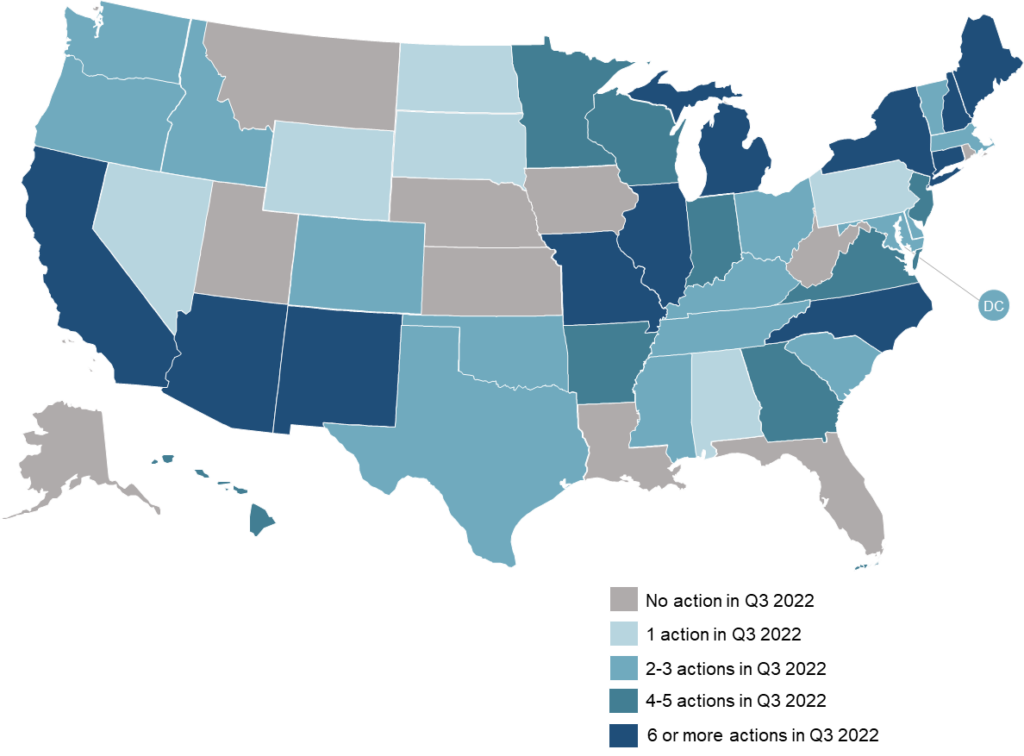The 50 States of Solar: States Explore Tying Labor Requirements to Solar Programs During Q3 2022
Raleigh, NC – (October 19, 2022) The N.C. Clean Energy Technology Center (NCCETC) released its Q3 2022 edition of The 50 States of Solar. The quarterly series provides insights on state regulatory and legislative discussions and actions on distributed solar policy, with a focus on net metering, distributed solar valuation, community solar, residential fixed charges, residential demand and solar charges, third-party ownership, and utility-led rooftop solar programs.
The report finds that 40 states, plus the District of Columbia, took some type of distributed solar policy action during Q3 2022 (see figure below), with the greatest number of actions continuing to address net metering policies (58), community solar policies (46), and residential fixed charge or minimum bill increases (28). A total of 174 distributed solar policy actions were taken during Q3 2022, with the most actions taken in California, Connecticut, New York, Illinois, Michigan, North Carolina, Arizona, Maine, Missouri, New Hampshire, and New Mexico.
Q3 2022 Policy Action on Net Metering, Rate Design, and Solar Ownership

The report identifies three trends in solar policy activity taken in Q3 2022: (1) states tying labor requirements to solar programs, (2) policymakers and regulators examining improvements for the next iterations of community solar programs, and (3) states and utilities considering the resilience value of distributed solar.
“Several states took actions to build off the momentum of their existing policies, whether its lifting caps in their community solar programs or reassessing their net metering rules. ,” noted Brian Lips, Senior Policy Project Manager at NCCETC.
The report notes the top five distributed solar policy actions of Q3 2022:
- Mississippi regulators adopting revised distributed generation rules;
- California lawmakers enacting legislation to expand community solar in the state;
- The Virginia Corporation Commission establishing a minimum bill for community solar participants;
- North Carolina regulators authorizing a third-party power purchase agreement for a military facility; and
- The Illinois Commerce Commission approving the state’s Long-Term Renewable Resources Procurement Plan.
“Solar and other distributed energy resource assets are often part of grid resilience plans. Several of this quarter’s pending solar actions count resilience as a goal or additional benefit,” said Vincent Potter, Policy Analyst at the NCCETC, “Georgia regulators approved a stipulation including a tariff that would allow certain Georgia Power customers to have utility-owned solar or other generation on their site for resiliency during grid outages.”
View the 50 States of Solar Q3 2022 Quarterly Report Executive Summary
View and Purchase the 50 States of Solar 2022 Q3 Update FULL Report
View other 50 States Reports – Solar, Grid Modernization and Electric Vehicles
ABOUT THE N.C. CLEAN ENERGY TECHNOLOGY CENTER
The N.C. Clean Energy Technology Center, as part of the College of Engineering at North Carolina State University, advances a sustainable energy economy by educating, demonstrating and providing support for clean energy technologies, practices and policies. It serves as a resource for innovative, sustainable energy technologies through technology demonstration, technical assistance, outreach and training. For more information about the Center, visit: http://www.nccleantech.